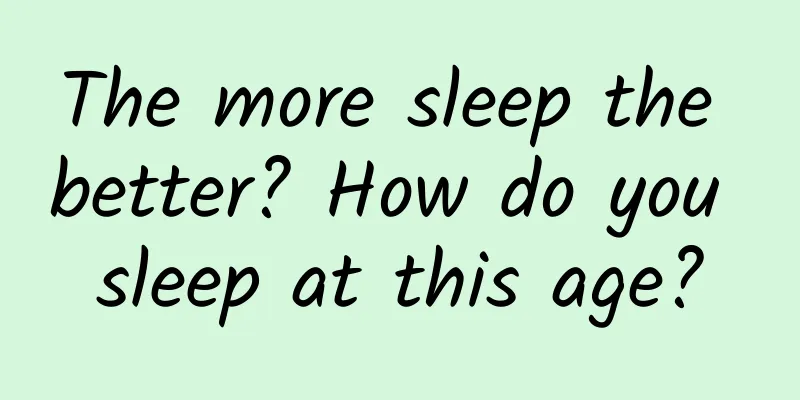Did you skip brushing your teeth during the Spring Festival holiday? Beware of bad breath!

|
When you are lying in bed getting ready to fall asleep late at night, you suddenly remember one thing and keep tossing and turning - you haven't brushed your teeth yet. "Should I turn on the light, get out of bed, brush my teeth, and then go back to sleep?" At this time, I believe many people are reluctant to leave the bed and choose to be lazy. Little do they know that many diseases that affect oral health are hidden in such daily luck. Copyright image, no permission to reprint The fourth national oral health epidemiological survey report showed that the detection rate of gingival bleeding in the 12-year-old age group was 58.4%, and the detection rate of tartar was 61.3%. As people age, their oral health status gradually deteriorates. By the age of 55-64, the periodontal health rate of Chinese people is only 5%, and the prevalence of oral diseases exceeds 90%. In other words, 9 out of 10 Chinese people have oral diseases. For a long time, dental caries, gingival inflammation and bleeding, bad breath, sensitivity and tooth loss have been common oral problems that have plagued the Chinese people. In fact, the source of many oral problems is caused by pathogenic bacteria in the mouth, and not brushing teeth at night is the "hidden killer" that is most easily overlooked. 01 Bacteria, the permanent residents of the mouth In fact, our mouth is always an absolutely bacterial environment. With daily chewing, eating, swallowing saliva and other actions, there are more than 500 bacterial strains floating in the mouth, maintaining a relatively balanced state. Within a few minutes after we finish brushing our teeth, salivary glycoproteins can selectively adsorb on the surface of teeth to form an acquired film . Although it is only a few microns thick, it is a perfect "landing point" for many bacteria and also provides a suitable living environment for oral pathogens. Experiments have detected a variety of bacteria, including periodontal pathogens, from early dental plaque, but this is just the beginning of the reproduction of oral bacteria. Schematic diagram of the formation of acquired dental membrane, source: Reference [2] The first batch of microorganisms that colonize in the early stage adhere to the surface of teeth, gingival epithelium and other periodontal tissues, where they spread rapidly with a reproduction cycle of hours. After 24 hours, the bacterial colonies completely fused and covered the tooth surface; after 48 hours, the originally relatively simple acquired film "evolved" into a dental plaque biofilm. It should be noted that dental plaque biofilm is not a simple superposition of bacterial structures, but an extremely complex microbial community. They multiply very quickly and form "villages" in different parts of the periodontium. In a healthy state, the normal activities of the flora do not cause harm to the body . However, under certain special conditions (such as not brushing your teeth in time causing an imbalance in the pH of the mouth), harmful bacteria begin to attack the tissues around the teeth, leading to the occurrence of oral diseases. 02 Brushing your teeth before going to bed is very necessary It is not difficult to see that the speed of bacterial proliferation from bacteria floating in the mouth to the formation of dental plaque is amazing. Before the formation of dental plaque biofilm, the combination of bacteria and teeth is not actually strong. Therefore, if you want to "block" the formation of dental plaque biofilm, brushing your teeth in time is an effective means . When the bacteria floating in the mouth are looking for a place to settle, we use the "mechanical friction" of the toothbrush to destroy the bacterial attachment, and the biofilm on the teeth will fall apart. This is why dentists have always recommended brushing your teeth twice a day. Brushing your teeth is a regular cleaning of the oral environment, not giving bacteria a chance to take advantage. Among them, brushing your teeth at night is particularly important. Copyright image, no permission to reprint The oral environment after dinner is conducive to bacterial reproduction. When people sleep with their mouths closed, the oral cavity is often in a closed and oxygen-deficient state, making it easier for harmful bacteria to breed and multiply. At the same time, changes in saliva secretion at night are also an important condition that is overlooked by many people. You should know that the amount of saliva secreted during the day is eight to ten times that of the night, and saliva can inhibit the growth of bacteria to a great extent. When the amount of saliva secreted in the mouth drops sharply at night, the lysozyme in the saliva that can protect the teeth also decreases sharply with sleep, which is tantamount to giving bacteria a more relaxed breeding environment. If you are lazy and go to bed without brushing your teeth at night, and then brush them in the morning, you are giving dental plaque twice the time to expand and finally settle firmly on the teeth. However, survey data show that only 36% of adults in my country brush their teeth twice a day, and more than 60% of adults fail to meet basic oral hygiene standards. In other words, the oral health of most people is not optimistic. 03 Threats to Oral Health Often difficult to detect I believe many people have had this experience: if you don’t brush your teeth at night, your mouth will smell particularly bad the next morning. This is indeed the case. 80% of bad breath is caused by oral problems, and a small part comes from the stomach and digestive tract. Modern medicine believes that bad breath is caused by the excessive reproduction of harmful oral bacteria - anaerobic bacteria at night, which decompose and digest food residues, cells, organic matter and blood in the mouth to produce volatile sulfides. Copyright image, no permission to reprint You can think of bad breath as a "little revenge" for not brushing your teeth at night, but if the bad breath problem is not dealt with in a timely manner, more dental diseases are quietly brewing. When liquids and food residues sent into the mouth remain in the gingival sulcus for a long time, bacteria gather to form plaque. As the plaque continues to accumulate and calcify, it will eventually advance to tartar. At this time, dental tartar is the nest of bacteria. It absorbs a large amount of bacterial toxins and together with new dental plaque constantly stimulates the gums, causing inflammation and even bleeding. Over time, when the gums shrink and periodontal tissues are destroyed, it will further deteriorate into "periodontitis". In addition to these obvious problems, the "little black gaps" that silently exist on many people's teeth may also be a sign of tooth decay. Copyright image, no permission to reprint When food residues in the mouth (including sugars) are broken down by bacteria, acids are produced that corrode the hard tissues of the teeth day after day, causing demineralization of the tooth surface and, over time, tooth decay occurs. These dental problems that have accumulated over time cannot be solved by simply brushing your teeth. Expensive packages such as root canal treatment and tooth fillings at dental hospitals are beckoning you. In fact, the mouth is a "window" to other parts of the body, and oral health can reflect the health of the whole body. It is not only a direct manifestation of dental and periodontal diseases, but is also closely related to systemic diseases such as heart disease, diabetes, and digestive system diseases. The World Health Organization has listed oral health as one of the top ten standards of human health. From personal eating habits to cultivating good brushing habits, oral care is a "systematic" project. No matter morning or night, taking every brushing seriously and caring for every corner of the mouth carefully can shape the health of the whole body and improve our quality of life. References: [1] Oral health status of Chinese residents: Report on the Fourth Epidemiological Survey on Oral Health in China [2] Wu Rihan. Formation and control of dental plaque biofilm[N]. Acta Microbiologica Sinica, 2018, 58(11) [3] Zhou Xuedong. Human oral microbiome and dental plaque biofilm[J]. West China Journal of Stomatology, 2010, 28(2) Author | jting Review | Si Yan, Chief Physician and Associate Professor, Department of Oral Preventive Health Care, Peking University Hospital of Stomatology This article is produced by "Science Popularization China". Please indicate the source when reprinting. The pictures in this article are from the copyright gallery and are not authorized for reproduction. |
<<: 【Smart Farmers】A little romance! Scientists develop pink cotton
Recommend
A comet that appears once every 50,000 years reappears. Why does this comet look green?
Produced by: Science Popularization China Author:...
World Pancreatic Cancer Day丨Faced with the “King of Cancer”, can we only surrender?
The third Thursday of November is World Pancreati...
"Perfect Diary" brand marketing strategy
Even straight men may be familiar with the four w...
How to plan an event? Four ways to plan an event!
Last week, a friend asked me why I didn’t share s...
My first experience with advertising embedded in the body of a public account. What is the promotion effect?
Some time ago, my official account was fortunate ...
Self-portraits in the “Autumn Tiger”: Either arrogant or low-key, I love to go to these cities
China Weather Network News: Recently, the "a...
79 New Consumer Brand Marketing Tips
To achieve success in one fell swoop is to occupy...
Be determined not to be a “lone swimmer”, please remember this knowledge!
The weather is hot in summer How to avoid drownin...
Mobile payment is having a hard time going global: Scanning is not popular, and credit card payment is also upgrading
The fact is that the majority of people who use A...
Industry promotion is undergoing transformation: 30% of companies that buy traffic no longer do so!
Recently, the author went to Shenzhen to attend a...
B station product analysis report!
The article provides a brief analysis of Bilibili...
2021 Xiaohongshu High-efficiency Marketing Manual
Xiaohongshu is a lifestyle sharing platform that ...
Several existing problems and solutions for App Store search
Apple's volatility has only increased recentl...
2 tips to improve the efficiency of SEM account delivery! Collected~
In our promotion process, how to set up new SEM a...
With only a junior high school education and a physical disability, he became a world-renowned mathematician|Time Letter
Special Project of Beijing Science Center Origina...









